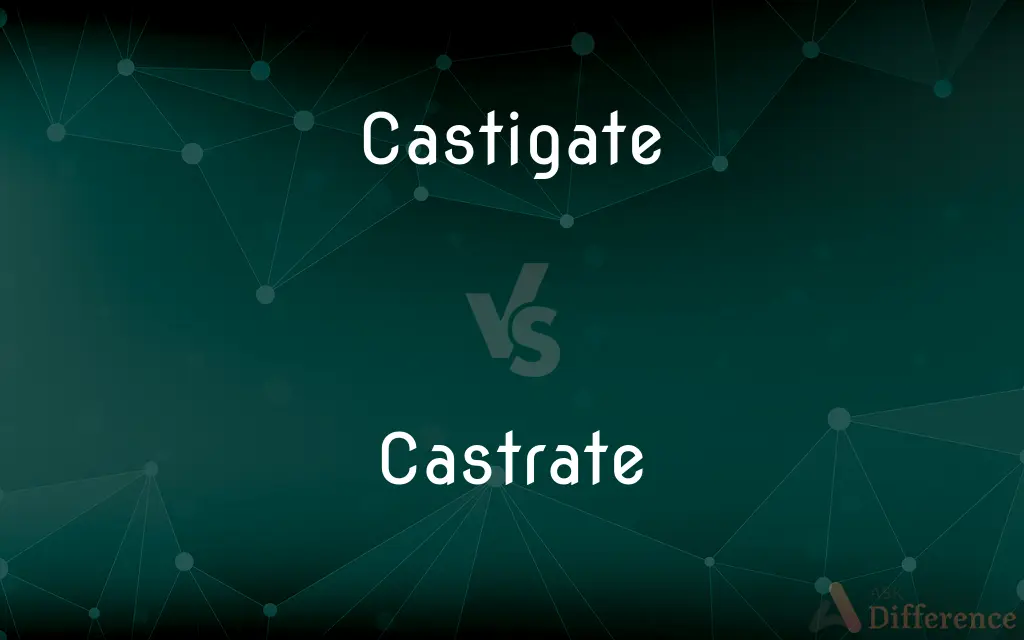Castigate vs. Castrate — What's the Difference?
By Tayyaba Rehman & Urooj Arif — Updated on April 25, 2024
Castigate involves scolding or criticizing severely; castrate means to remove the reproductive organs or to render ineffective.

Difference Between Castigate and Castrate
Table of Contents
ADVERTISEMENT
Key Differences
Castigate refers to the act of reprimanding someone harshly, usually to correct or discipline, while castrate, in its literal sense, involves surgically removing the reproductive organs of an animal or person.
In terms of figurative language, to castigate can mean to subject someone to severe punishment in terms of verbal or written criticism, whereas to castrate figuratively can mean to take away someone's power or effectiveness.
Castigate typically relates to moral or performance correction, aiming at improvement or deterrence of behavior, while castration as a metaphor might be used to describe reducing an organization's power or functionality, such as by cutting funds or limiting authority.
The use of castigate is more common in judicial, educational, or personal development contexts, emphasizing corrective action through harsh feedback. On the other hand, castrate is often discussed in medical or veterinary contexts with literal implications, or used metaphorically in political or business discussions about reducing power or capability.
While castigation is a verbal or symbolic act, castration, especially in its primary sense, is a physical act that has permanent biological consequences.
ADVERTISEMENT
Comparison Chart
Definition
To reprimand severely.
To remove the reproductive organs.
Usage Context
Judicial, educational, personal.
Medical, veterinary, metaphorical.
Consequence Type
Emotional or psychological impact.
Physical or symbolic power reduction.
Figurative Meaning
Criticize harshly or punish.
Remove power or effectiveness.
Outcome Intention
Improvement or deterrence of behavior.
Reduction of capability or function.
Compare with Definitions
Castigate
To scold with the intention to correct.
The coach castigated the player to improve his tactics.
Castrate
To deprive of power, vitality, or vigor.
The new regulations castrated the company’s expansion plans.
Castigate
To criticize someone severely.
The manager castigated the team for their poor performance.
Castrate
To emasculate or weaken.
The censorship laws castrated the press’s freedom to report truthfully.
Castigate
To express strong disapproval.
He was castigated for his reckless driving.
Castrate
To surgically remove the testicles.
The bull was castrated to make it less aggressive.
Castigate
To punish or chastise verbally.
She was castigated by the media for her comments.
Castrate
To make ineffective or impotent.
His influence was castrated by the lack of support from peers.
Castigate
To rebuke formally.
The senator was castigated for ethics violations.
Castrate
To remove ovaries surgically.
The vet recommended to castrate the cat to prevent overpopulation.
Castigate
Reprimand (someone) severely
He was castigated for not setting a good example
Castrate
Remove the testicles of (a male animal or man).
Castigate
To punish or rebuke severely.
Castrate
A man or male animal whose testicles have been removed
Young human castrates, or eunuchs
Castigate
To punish or reprimand someone severely.
Castrate
To remove the testicles of (a male); geld or emasculate.
Castigate
To execrate or condemn something in a harsh manner, especially by public criticism.
Castrate
To remove the ovaries of (a female); spay.
Castigate
To revise or make corrections to a publication.
Castrate
To deprive of virility or spirit; emasculate.
Castigate
To punish by stripes; to chastise by blows; to chasten; also, to chastise verbally; to reprove; to criticise severely.
Castrate
An individual who is incapable of reproduction as a result of removal, destruction, or inactivation of the gonads.
Castigate
To emend; to correct.
Castrate
A castrated man; a eunuch.
Castigate
Censure severely;
She chastised him for his insensitive remarks
Castrate
(transitive) To remove the testicles of a person or animal.
Castigate
Inflict severe punishment on
Castrate
(transitive) To remove the ovaries and/or uterus of an animal.
Castrate
To take something from; to render imperfect or ineffectual.
Castrate
To deprive of the testicles; to emasculate; to geld; to alter.
Castrate
To cut or take out; esp. to remove anything erroneous, or objectionable from, as the obscene parts of a writing; to expurgate.
My . . . correspondent . . . has sent me the following letter, which I have castrated in some places.
Castrate
A man who has been castrated and is incapable of reproduction;
Eunuchs guarded the harem
Castrate
Deprive of strength or vigor;
The Senate emasculated the law
Castrate
Edit by omitting or modifying parts considered indelicate;
Bowdlerize a novel
Castrate
Remove the testicles of a male animal
Castrate
Remove the ovaries of;
Is your cat spayed?
Common Curiosities
What is the origin of the word "castigate"?
"Castigate" comes from the Latin word "castigare," which means to chastise or to purify.
Can castigation affect workplace dynamics?
Yes, excessive castigation can lead to a toxic work environment, reducing morale and productivity, while constructive castigation can help maintain discipline and improve performance.
Is castration considered ethical in modern veterinary practice?
Yes, when performed under appropriate conditions with anesthesia and pain management, castration is considered ethical in veterinary practice for reasons like health benefits and population control.
Does castration have benefits in animal husbandry?
Yes, in animal husbandry, castration is used to manage breeding, control aggressive behavior, and influence the physical characteristics of livestock.
Can humans be legally castigated?
In legal terms, humans can be "castigated" in the form of judicial rebukes or penalties, but this is metaphorical and involves no physical harm.
What are the long-term effects of castration on animals?
Long-term effects can include changes in growth patterns, reduced risk of certain diseases, and behavioral changes.
How does societal perception differ between castigate and castrate?
Societal perception of castigation can vary from necessary discipline to abusive behavior, whereas castration is generally seen as a severe but sometimes necessary medical or behavioral intervention.
Are there alternative methods to surgical castration?
Yes, alternatives to surgical castration include chemical castration and immunocastration, both of which are used to temporarily reduce reproductive functions without surgery.
Can castigate be considered a form of emotional abuse?
Yes, if castigation is excessively harsh or unjust, it can be considered a form of emotional or verbal abuse.
What legal protections exist against unwarranted castigation in the workplace?
Legal protections include laws against workplace harassment and discrimination, which can cover unwarranted or discriminatory castigation.
How is castration viewed in historical contexts?
Historically, castration was sometimes used as a punishment or a means to create a distinct class of servants or officials, such as eunuchs, who served in royal courts.
How is castigation used in educational settings?
In educational settings, castigation can be a tool for enforcing discipline and correcting behavior, but it must be balanced with positive reinforcement to avoid negative psychological impacts.
Can castration be reversed?
Surgical castration is permanent; however, effects of chemical castration can sometimes be reversed by discontinuing the treatment.
What are the ethical considerations when choosing to castigate someone?
Ethical considerations include ensuring that the castigation is proportional, justified, and constructive, aimed at genuine correction rather than humiliation or harm.
Share Your Discovery

Previous Comparison
Dialling vs. Dialing
Next Comparison
Stamp vs. SealAuthor Spotlight
Written by
Tayyaba RehmanTayyaba Rehman is a distinguished writer, currently serving as a primary contributor to askdifference.com. As a researcher in semantics and etymology, Tayyaba's passion for the complexity of languages and their distinctions has found a perfect home on the platform. Tayyaba delves into the intricacies of language, distinguishing between commonly confused words and phrases, thereby providing clarity for readers worldwide.
Co-written by
Urooj ArifUrooj is a skilled content writer at Ask Difference, known for her exceptional ability to simplify complex topics into engaging and informative content. With a passion for research and a flair for clear, concise writing, she consistently delivers articles that resonate with our diverse audience.
















































